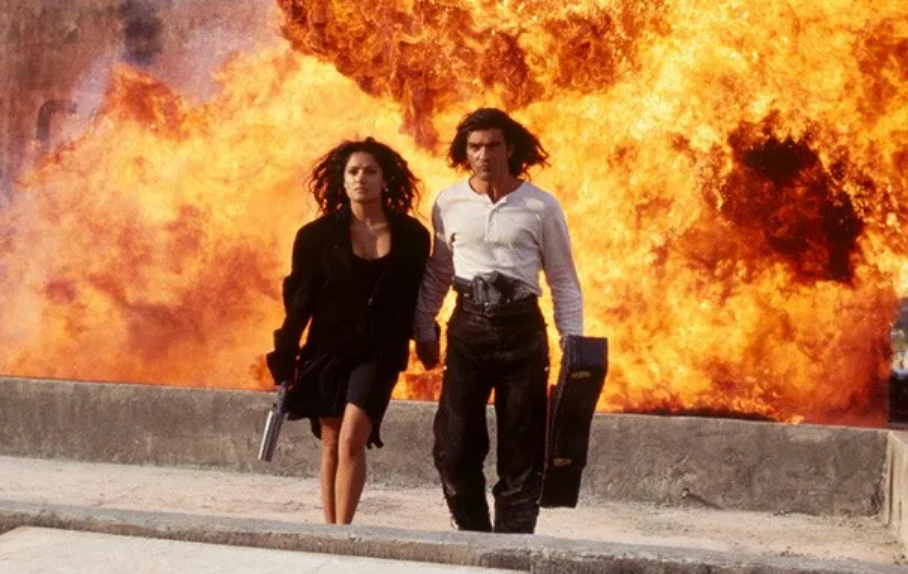Cliché quips and scenes in action thrillers

I thought The Irishman’s scriptwriter Steve Zalllian had introduced a characteristic mafioso refrain with the fatalistic line “It is what it is” that was repeated by various characters throughout the movie, usually to dismiss an unfortunate situation, until I kept up my Netflix binge-ing and encountered the quip in several TV drama series that antedated Martin Scorsese’s latest cinematic triumph.
Now Donald Trump has adopted the simplistic verbal shrug in referring to his country’s dismal (not in his view) struggle against the coronavirus. Talk about raising abject acceptance, if unknowingly, into MAGA-level cliché.
The seeming stoicism has given his critics additional ammo against the POTUS’ often-overweening lack of empathy, even as some pundits have observed that “It is what it is” is typical New Yorker cynic-speak.
But other scriptwriters have employed the idiomatic phrase in action dramas that feature other American environments — as another way of saying “Deal with it” or “What’s done is done.” In fact there was a 2001 film titled It Is What It Is directed by one Billy Frolic. Of course he was an NYU film graduate.
The New York Times pinpoints the idiom’s earliest known written reference as dating back to 1949, to a column written for The Nebraska State Journal by J.E. Lawrence:
“New land is harsh, and vigorous, and sturdy. It scorns evidence of weakness. There is nothing of sham and hypocrisy in it. It is what it is, without an apology.”
The phrase has also since become commonly used by sports coaches in post-mortem interviews, to express frustration or “resigned acceptance of a situation.” Among politicians, Al Gore used it in 2000 in accepting an electoral loss. In 2008, it became the title of a rap album by ABN.
Getting back to scripting for film, I’ve noted certain betrayals of fondness for a particular idiom when it’s assigned to different characters. Such a sample is “I’ll get out of your hair” in Suits, or “She’s a piece of work” in The Alienist.
Fortunately, The Alienist redeems itself with a generally superb script that included the following dialogue uttered wryly by the main character: “Capitalism is when people manipulate others. Socialism is the other way around.”
My nocturnal quarantine continues to rely on an over-indulgence in Netflix binge-ing, with action thrillers somehow winding up as the usual staple, with few exceptions.
After early forays with Stranger Things and Narcos (both of which for some reason I gave up on after a couple of seasons), I’ve enjoyed and completed Designated Survivor, Homeland, Suits, CLOY, Money Heist, Iron Fist, Better Call Saul, Breaking Bad, Ozark, Peaky Blinders, Punisher, Stateless and The Alienist. And I’ve just begun with the highly entertaining Sherlock (set in modern-day London).
The only movies I’ve enjoyed were The Irishmen, Equalizer, and repeat viewings of the Bourne and Matrix series (when I opted for HBO and Fox Movies). Busts have been Extraction and The Old Guard, while some series I’ve discontinued include Kingdom and Fauda.
For all the violence and gore that have attended my favored genre of cinematic escapism, I’ve noted the apparently inescapable cliché scenes for scriptwriters — apart from the over-reliance on the cellphone as a virtual character that advances, or telescopes, the narrative action. This is true even with what’s been declared as the best TV series of the new millennium, Breaking Bad — to which I agree, even if it bested GOT.
All that mayhem falls back on cliché scenes apart from fisticuffs and shootouts. Car chases are a given, with consequent smash-ups featuring protagonists that escape unscathed.
Most foot chases are conducted through restaurant or hotel kitchens, while tension is provided by confrontational scenes in basement parking areas and empty warehouses. Dockside areas are another favored setting, as are rooftops and stairwells.
The bad guys are shot inside lifts, but the good guys usually escape through the ceiling. Hotel corridors are a favorite arena for brawling, assassination, or massacres of bodyguards. Torture usually features being bound to a chair or hoisted up by a hook in some bodega. Quiet moments, even suspenseful ones, make use of park benches.
Punch-outs are accomplished, sometimes to extermination, when a protagonist is already down on the floor or ground. Repeated stabbings, eye-gouging, and unloading automatic fire at point-blank range have become standard, with John Wick et al.
Protagonists, especially heroes, are blessed with such amazing powers of recovery. Some of them even know how to extract bullets from their own flesh, or badger partners to do it for them. A standard accessory is a whisky bottle, some contents of which are poured into wounds or areas of imminent surgery, with the rest drunk to steel oneself against the pain of metal extraction.
Whenever the skilled operative sets up a fiery explosion, he coolly walks off the area of the blast just in time to get far enough, but barely, with the conflagration and resulting debris just falling short of his heels. And the standard shot is of the hero smugly walking on without even casting a look back at the damage he’s engineered.
All these have become cinematic clichés, yet they are reprised in every other action movie. It is what it is.
Our own scriptwriters may make up for production and special effects disadvantages by relying on our frequent excess of the unusual.
An ostrich running on a street in a Quezon City subdivision, or a congressman’s wife offering a bounty on social media for anyone who can take pictures of her husband together with his mistress — now, those are the kind of refreshing seed ideas and premises for action thrillers.
And for the quip that sums it all up as acceptance, well, “Bahala na si Batman” has long been replaced with “Ano pang magagawa natin?” Or “Inutil ako riyan.”


